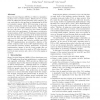Free Online Productivity Tools
i2Speak
i2Symbol
i2OCR
iTex2Img
iWeb2Print
iWeb2Shot
i2Type
iPdf2Split
iPdf2Merge
i2Bopomofo
i2Arabic
i2Style
i2Image
i2PDF
iLatex2Rtf
Sci2ools
DAC
1997
ACM
1997
ACM
Remembrance of Things Past: Locality and Memory in BDDs
Binary Decision Diagrams
BDDs
are e cient at manipulating large sets in a compact manner. BDDs, however, are inefcient at utilizing the memory hierarchy of the computer. Recent work addresses this problem by manipulating the BDDs in breath- rst manner
BFS
. BFS processing is quite successful at reducing the number of page faults when the BDDs do not t in the available physical memory. When paging does not take place, it is much less clear which paradigm leads to the better performance. In this paper, we perform a detailed analysis of BFS and DFS packages using simulation and direct performance monitoring of the memory hierarchy. We show that there is very little di erence in TLB and cache miss rates for DFS and BFS paradigms. We also show that di erences in execution time between carefully tuned BFS and DFS implementations are primarily a function of the lossless computed table used in BFS implementations, and not a function of memory locality. Furthermore, we present implementatio...
| Added | 06 Aug 2010 |
| Updated | 06 Aug 2010 |
| Type | Conference |
| Year | 1997 |
| Where | DAC |
| Authors | Srilatha Manne, Dirk Grunwald, Fabio Somenzi |
Comments (0)

